
The World Between Two Covers
Reading the Globe
کتاب های مرتبط
- اطلاعات
- نقد و بررسی
- دیدگاه کاربران
نقد و بررسی

February 16, 2015
As journalist Morgan relates in this introspective debut, she took it upon
herself to learn more about international literature after looking at her shelves and realizing that her reading had been almost exclusively British and North American. Her project (which she turned into a blog, A Year of Reading the World) was to devote a year to reading books from each of the world’s 196 countries. Morgan explored cultural differences in storytelling styles while reading the mythology-steeped Telesa YA series by Samoan author Lani Wendt Young. She also learned about propaganda and censorship from Uzbek novelist Hamid Ismailov’s The Railway, and she reflected on how the West views totalitarian regimes after reading My Life and Faith, the memoir of North Korean war hero Ri In Mo. The book’s themes include the difficulties of getting published in other languages, the imperfection of translation, and the inequities of a global cultural tradition still dominated by Western imperialism. While Morgan briefly touches on the individual books she read (a full list appears in the back), her purpose is to examine publishing and access to books on a global scale, not to summarize her reading experience. For that, readers can go to her blog. The reward for readers of this volume is a greater appreciation of global literature and the inspiration to reexamine one’s own reading habits. Agent: Caroline Hardman, Hardman & Swainson.

February 1, 2015
Exploring the world, one book at a time.American bookstores stock only a tiny selection of translated works, making it nearly impossible for readers to gain access to world literature. In her lively, debut book, journalist and blogger Morgan, regretting that she has been "a literary xenophobe," recounts her project to spend a year reading one book, translated or written in English, from every country in the world. That project proved more difficult than she imagined: In many countries, publishers release thousands of translated copies of Anglophone authors, rather than support indigenous writers. The literary world, therefore, has been dominated by books from a few nations, and readers "can never entirely remove the blinkers and filters put on our reading goggles." Censorship has impeded publication, too, as Morgan discovered when she tried to find literature from North Korea. A cultural delegate responded that "he was not aware of any adult fiction produced in the entire seven-decade history of the republic" but only politically oriented works that "demonstrated loyalty, honour, and self-sacrifice for the motherland." The ubiquity of English has had an impact on academic writing as well as commercial books. Scholars worry "that other languages are denuded of the specialist terms needed to express complex ideas and discoveries" by the pressure to write in English. Some fiction writers, striving for publication, try to imitate Western-style novels rather than draw upon their own cultures. Reading indigenous works that evoke a new time and place, though-like a hugely popular young-adult series written by a Samoan housewife-confronted Morgan with ideas and views that felt startlingly fresh. An appendix lists 196 books that the author read on her journey, including selections from Bhutan, Cape Verde, Ivory Coast, Iraq and Sierra Leone; most were published by small, independent presses. Morgan's intrepid literary project underscores the crucial importance of stretching the boundaries of one's aesthetic and intellectual worlds.
COPYRIGHT(2015) Kirkus Reviews, ALL RIGHTS RESERVED.

April 1, 2015
When journalist Morgan realized she was a "literary xenophobe," she decided to spend 2012 reading (and blogging about) a book-length narrative from each country in the world as, she said, "part-penance, part-prophylactic." Her blog, ayearofreadingtheworld.com, contains detailed entries on her experiences with each book she chose. This title explores the venture as a concept and as a whole project, addressing the many sticky issues Morgan dealt with along the way: How many countries exist? Says who? What exactly is world literature? What about authenticity? Politics? Censorship? Translations? How does one get books from [insert country here]? How does one read and blog about almost 200 books in one year and still have a job? Should one research a culture, or contextualize a narrative before reading a work? (Morgan says no, in what initially feels like an anti-intellectual attack; her tone gradually tempers.) This would have been a fascinating project to follow as it proceeded. VERDICT Fans of the author's blog may appreciate this in-depth concluding exploration. Readers who are new to the project may be less hooked into the work and might benefit from looking at the blog first. [See Prepub Alert, 11/24/14.]--Audrey Snowden, Orrington P.L., ME
Copyright 2015 Library Journal, LLC Used with permission.

April 1, 2015
Well read though she was, Morgan accepted that she was a literary xenophobe, having read only British and American writers. She pledged to do something about it in a yearlong challenge to read the world196 nationsthrough books. Generous strangers and book lovers across the globe flooded her with recommendations. Confronted with so many choices, Morgan also had to ponder how translations, notions of cultural authenticity, shifting borders, and preconceived expectations of different cultures factor into reading books from other cultures. Among her discoveries: works by peripatetic authors with hard-to-pin-down nationalities, such as Oonya Kempadoo's Buxton Spice (1999), Mongolian Galsan Tschinag's The Blue Sky (2006), Burundian Marie-Therese Toyi's Weep Not, Refugee (2007), the Samoan YA series Telesa, and works by such challengers to cultural nationalism as Haitian Canadian Dany Laferriere's I Am a Japanese Writer (2008). Morgan considers how the same imperialist impulses that have put Europe at the center of mapmaking have applied to valuing literature, and she offers Goethe's appeal 200 years ago to read widely of other cultures. Sound advice and, given Morgan's guide, no excuses.(Reprinted with permission of Booklist, copyright 2015, American Library Association.)

























دیدگاه کاربران